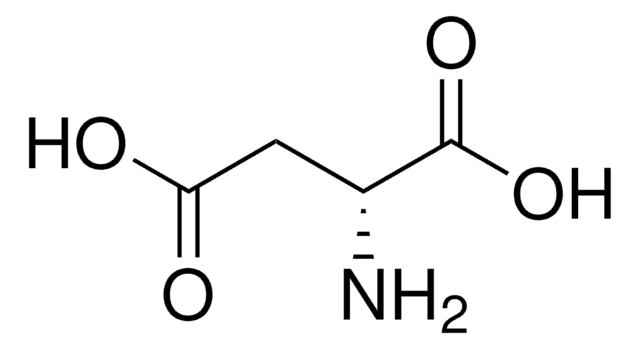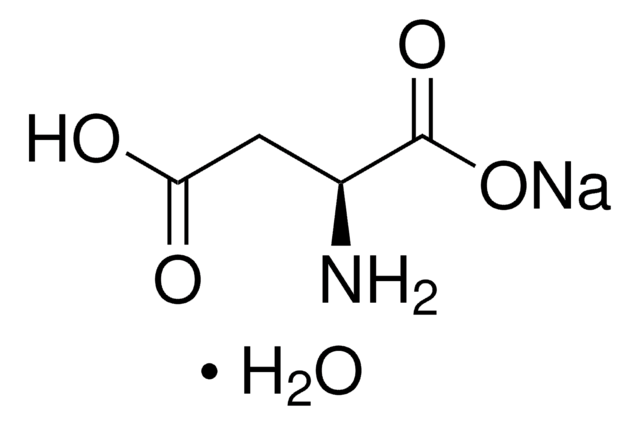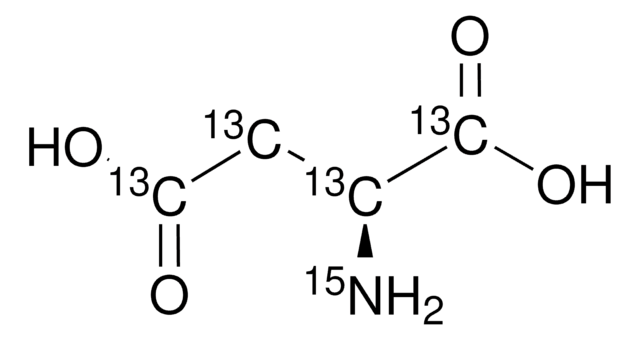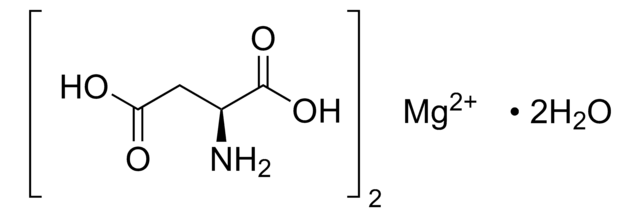11189
L-Aspartic acid
≥99.5% (T), BioUltra
Synonym(s):
(S)-(+)-Aminosuccinic acid, (S)-Aminobutanedioic acid
About This Item
Recommended Products
product name
L-Aspartic acid, BioUltra, ≥99.5% (T)
product line
BioUltra
Quality Level
Assay
≥99.5% (T)
form
powder or crystals
optical activity
[α]20/D +24.7±1°, c = 5% in 5 M HCl
impurities
insoluble matter, passes filter test
≤0.3% foreign amino acids
ign. residue
≤0.05% (as SO4)
loss
≤0.1% loss on drying, 110 °C
color
white
mp
>300 °C (dec.) (lit.)
solubility
1 M HCl: 0.5 M at 20 °C, clear, colorless
anion traces
chloride (Cl-): ≤50 mg/kg
sulfate (SO42-): ≤150 mg/kg
cation traces
Al: ≤5 mg/kg
As: ≤0.1 mg/kg
Ba: ≤5 mg/kg
Bi: ≤5 mg/kg
Ca: ≤10 mg/kg
Cd: ≤5 mg/kg
Co: ≤5 mg/kg
Cr: ≤5 mg/kg
Cu: ≤5 mg/kg
Fe: ≤5 mg/kg
K: ≤50 mg/kg
Li: ≤5 mg/kg
Mg: ≤5 mg/kg
Mn: ≤5 mg/kg
Mo: ≤5 mg/kg
NH4+: ≤200 mg/kg
Na: ≤100 mg/kg
Ni: ≤5 mg/kg
Pb: ≤5 mg/kg
Sr: ≤5 mg/kg
Zn: ≤5 mg/kg
λ
0.5 M in 1 M HCl
UV absorption
λ: 260 nm Amax: 0.20
λ: 280 nm Amax: 0.10
SMILES string
N[C@@H](CC(O)=O)C(O)=O
InChI
1S/C4H7NO4/c5-2(4(8)9)1-3(6)7/h2H,1,5H2,(H,6,7)(H,8,9)/t2-/m0/s1
InChI key
CKLJMWTZIZZHCS-REOHCLBHSA-N
Gene Information
human ... CA1(759) , CA2(760)
rat ... Grin2a(24409)
Looking for similar products? Visit Product Comparison Guide
General description
Application
- as a metabolite to study the enzyme–metabolite interactions in the central metabolism of Escherichia coli by nuclear magnetic resonance (NMR)
- in transmission electron microscopy
- as a component of complete media for culturing Yeast strain
Biochem/physiol Actions
Storage Class Code
11 - Combustible Solids
WGK
WGK 1
Flash Point(F)
Not applicable
Flash Point(C)
Not applicable
Personal Protective Equipment
Certificates of Analysis (COA)
Search for Certificates of Analysis (COA) by entering the products Lot/Batch Number. Lot and Batch Numbers can be found on a product’s label following the words ‘Lot’ or ‘Batch’.
Already Own This Product?
Find documentation for the products that you have recently purchased in the Document Library.
Customers Also Viewed
Our team of scientists has experience in all areas of research including Life Science, Material Science, Chemical Synthesis, Chromatography, Analytical and many others.
Contact Technical Service







